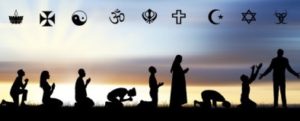
I appreciate a co-worker at Smithfield Foods recently wanting to talk to me about his struggle with various religions’ claims of having exclusive Truth. (We haven’t yet met for that drink to discuss it in more depth, but we will. He’s a Facebook friend, so he’s probably reading our thoughts here.) I admit, as a Jesus-follower, I believe His words in John 14:6–“I am the way, the truth, and the life. No one can come to the Father except through me.” But, they are challenging for me as a guy who likes everyone to get along and be happy. They are probably more challenging, even troubling, for the majority of people in the world, who are non-Christians.
The following words come from my book, A Search for Common Ground: Let’s Talk: “I have heard it said, “It does not matter what religion you have because we all believe in the same God and we are all going to the same place after we die anyway.” Mahatma Gandhi was a great man of peace for India and for the world, and he was one for religious tolerance. Gandhi insisted, “The need of the moment is not one religion, but mutual respect and tolerance of the different religions…Any attempt to root out traditions, effects of heredity, etc., is not only bound to fail, but is a sacrilege. The soul of religions is one, but is encased in a multitude of forms. The latter will persist to the end of time…Truth is the exclusive property of no single scripture…I cannot ascribe exclusive divinity to Jesus. He is as divine as Krishna or Rama or Mohammed or Zoroaster.”
“Religious tolerance and religious freedom are important human rights. People of different belief systems should respect each other and learn from each other. But, is religious truth as relative as Gandhi and others believe it to be? That is challenged by certain truths proclaiming themselves to be absolute and exclusive over all other truths. If a crime is committed by one person against another person and there are no witnesses, it is the legal system’s task to find the one truth of what exactly happened. Though different versions of what happened may be presented, there is only one truth of what really happened. In the same way, when a religion is in complete disagreement with another religion’s version of truth, it would seem incorrect for a person to declare that something they believe to be false is true for someone else. Though opinions may vary, it ultimately is either true for life, or it is false.”
How do you personally process/digest Jesus’ words–“I am the way, the truth, and the life. No one can come to the Father except through me?” More than wanting to know whether or not you believe Jesus’ words, I wonder how you process/digest/feel about Jesus’ words, because that likely is a determining factor in how you move forward as a person. That may be a ‘determinator’ in what kind of believer or non-believer you are.